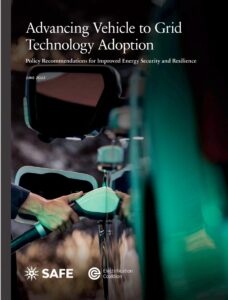As electric vehicle (EV) adoption accelerates across all vehicle classes, V2G capability can help manage system load and provide power back to the grid during times of need, thereby strengthening the resiliency of the U.S. electric grid. The transition to transportation electrification reduces our dependency on oil and improves energy and national security.
The report, “Advancing Vehicle-to-Grid Technology Adoption,” calls on policy makers to “future-proof” electric vehicles and charging infrastructure to ensure that the U.S. is poised to take advantage of V2G’s many benefits. Given increased frequency of unprecedented extreme weather events, the technology can enhance critical infrastructure resilience and emergency preparedness. V2G enables EVs to serve as “mobile energy storage units” and can provide power during outages. With bidirectional charging technology, EVs can help manage system loads during periods of high electricity demand. A single electric school bus, for example, has enough battery storage capacity to power a hospital operating room for almost two full days.
The technology can help accelerate the adoption of EVs by unlocking these and other new value streams for EV owners and mitigating the total cost of ownership. With the appropriate policies in place, EV owners could receive compensation for the grid services their vehicles provide. These benefits can apply to all vehicle sectors, from light-duty passenger vehicles to medium- and heavy-duty trucks and buses.
The policy recommendations contained in this report represent the latest step in SAFE and the EC’s ongoing V2G Initiative. They aim to accelerate the adoption of this crucial technology by building on recently enacted federal V2G policies.

